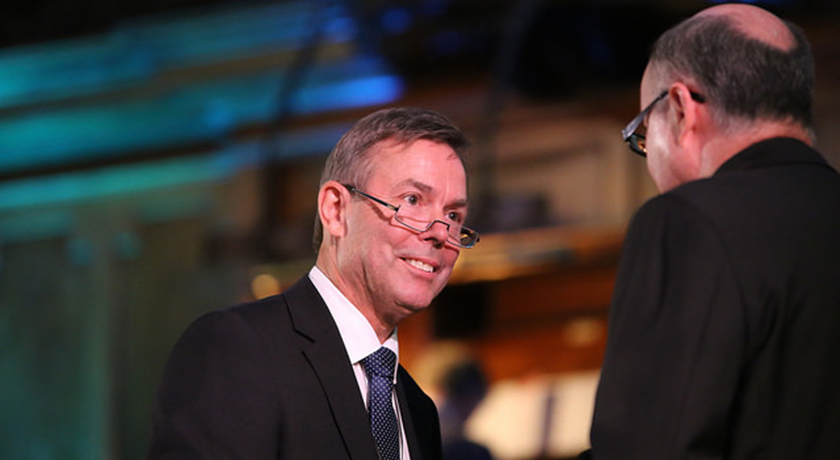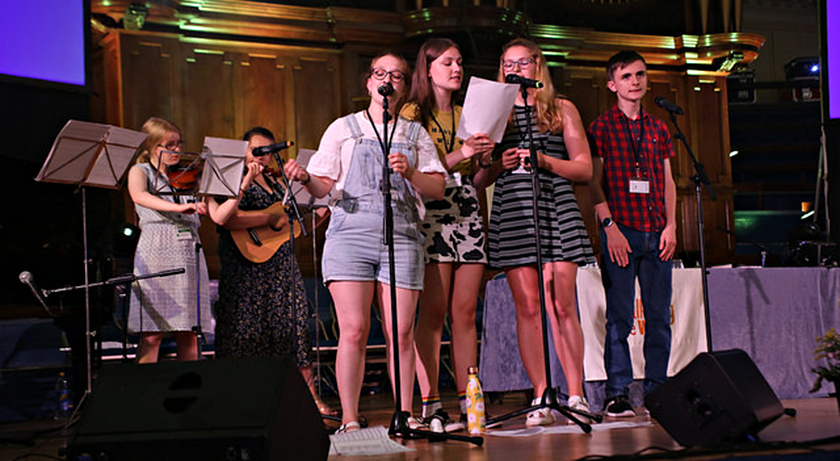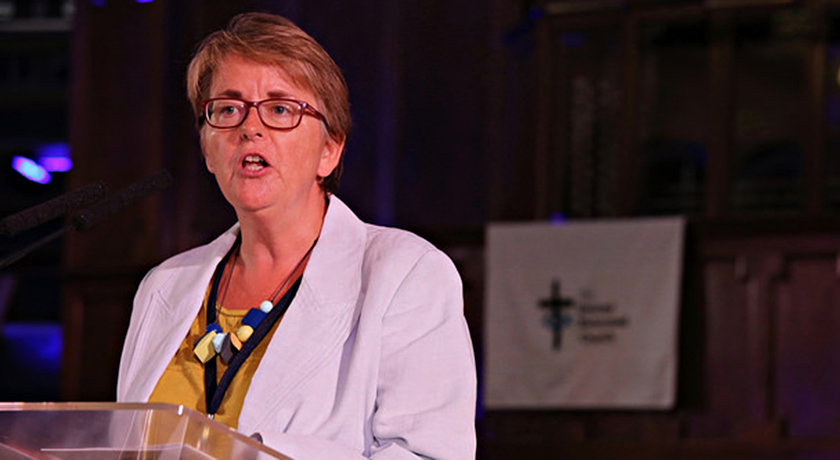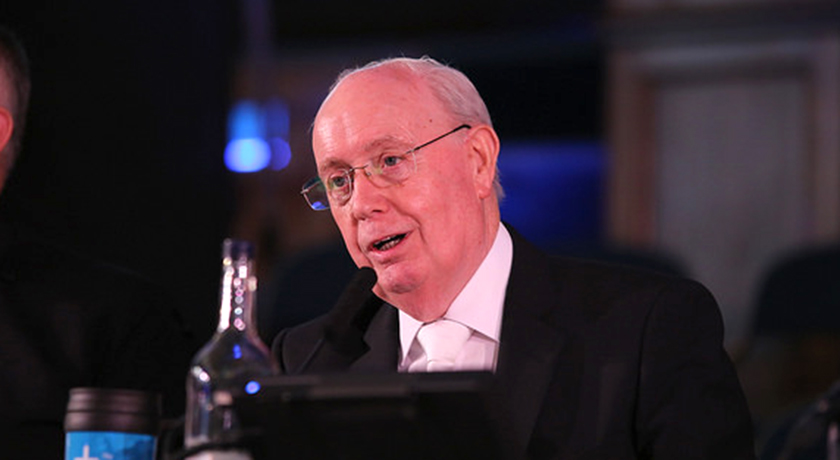 Business session six:
Business session six:
Outgoing moderator's final Assembly speech offers encouragement
Mr Alan Yates, outgoing Moderator of the United Reformed Church General Assembly, gave an encouraging address on the final day of the denomination's 2018 Assembly (Monday 9 July). Referring to declining church membership, Mr Yates ended by saying: 'Being small does not prevent us [the URC] from being successful.'
Received by the Assembly with appreciative applause, Mr Yates' speech offered reflections on his call, reflection on his fear and concerns for the URC, and enthusiastic praise for local churches. Mr Yates recognised the contribution of the URC's 'fantastic' large churches but particularly championed smaller churches that make good use of limited resources, and often working creatively and collaboratively. He said: 'Across our three nations ... I have been impressed and encouraged by the way the URC is demonstrating the love of God.'
Mr Yates thanked many people for 'superb support and guidance' but extended special thanks to the Revd Kevin Watson – with whom Mr Yates served as Assembly moderator – describing him as 'a wonderful partner and friend; extremely competent and diligent ... and, best of all, accepting and encouraging'. He argued that the Christian 'task is to love the Lord our God and to love our neighbour as ourselves. If we are obedient to that command we can let God worry about the rest.' Click here to read the full text of Mr Yates' address.
 Encouraging equality, cherishing diversity – resolution 24
Encouraging equality, cherishing diversity – resolution 24
The Revd Helen Mee, convenor of the equalities committee, presented resolution 24 the committee’s paper, ‘Encouraging equality, cherishing diversity’, which explored the ways in which the nominations committee could be supported in the attention it gives to diversity within the structures and committees of the denomination as an expression of who we understand ourselves to be as Church.
In discussion, members of the Assembly expressed a desire to see the attention given to diversity extended to the whole of the Church not just the nominations committee; and expressed personal commitments to find ways to achieve this.
The resolution was amended to include furthering equalities within the life of the whole Church, which was passed by consensus.
The committee’s resolution 23, which extended its membership to include a nominee from URC Youth, was passed by consensus on Saturday, day two of Assembly.
Widening the reach of non-stipendiary ministry Resolutions 29 and 30
The Revd Paul Whittle, convenor of the ministries committee, presented a paper on the expansion of non-stipendiary ministry (NSM) of Word and Sacraments in the United Reformed Church – to include locally ordained minsters.
Mr Whittle began by requesting permission to add these words – ‘noting that the training is not required to meet the standard set out in Resolution 37 of 1997 and that further training may be required before an NSM model four may transfer to stipendiary ministry’ – to the end of the resolution. Following some short debate from the floor on this, permission was granted.
In his introductory speech Mr Whittle said: ‘Ministry comes in a variety of shapes and sizes – but is always a resource, always a gift, always a calling. One of the great riches of the United Reformed Church is that of non-stipendiary ministry.’ He briefly explained that, since the introduction of ‘auxiliary ministry’ as it was then known, NSM ministry had expanded into four models – being part of a team within a congregation, being in pastoral charge, being part of a team caring for a group of congregations, and ministry in the workplace.
The thrust of the paper, and Mr Whittle’s presentation, was the understanding that, although every congregation needs effective leadership, ‘spreading ministers more thinly’ was not the answer
Assembly was reminded of 1995’s ‘The Patterns of Ministry’ which identified three types of ministry, including local ministers, described as ‘only available to serve in a regular capacity in a designated congregation or pastorate.’ That had not been accepted in 1995, but, said Mr Whittle, ‘times move on … 23 years on, the ministries committee suggests that such a model now has an important role to play.’ Not disputing the importance of the effective ministry of elders, Mr Whittle said that there is an ongoing demand for Ministers of Word and Sacraments and this proposal would meet it. Admitting that ‘every detail is not in place and things can and will evolve as they do with ministry in general’ he said, ‘the crucial elements’ are all in place – the call of any candidate would be tested; appropriate training will be delivered under the auspices of the Resource Centres for Learning and this type of NSM ministry would not be transferable. He ended by describing the proposal as an exciting way to provide the United Reformed Church with more ordained ministers.
There was a long and varied debate with many members of Assembly wishing to speak. Many were in favour, welcoming the proposal as giving formal recognition to many in the Church. However, other speakers pointed out what they saw as flaws, such as creating a two-tiered system of ministry with NSMs being the more junior partner; others felt the proposal devalued ‘the ministry of all believers’ and provides something that the URC doesn’t need. ‘Why’ asked one speaker ‘do we feel we must ordain a person to make them acceptable?’ Another speaker said: ‘There are lots of ways to serve … sometimes it seems as if there are more ministers in a congregation than non-ministers. Calls are not all for ordained leadership … Let’s not “ordain, ordain, ordain!” … You don’t need to be a minister to offer your work and gifts to the Church’
There was also a call for a more general debate on ministry – specifically ‘what is ministry for?’ together with a demand to look at better ways of non-ordained leadership.
After several rounds of testing the mind of Assembly with consensus cards, the proposal did not gain enough support to proceed. Mr Uden, chairing the session ruled that this business should be remitted to Mission Council. Mr Whittle ‘said: ‘I am profoundly disappointed that yet again Assembly has declined to agree something that has come as a result of considerable work and seeks to offer a helpful new model.’
Assembly gives thanks for retired ministers' housing society
Resolution 37 – which called on the United Reformed Church General Assembly to give thanks for the 'valuable work' of and synod donations to the retired ministers’ housing society (RMHS) – passed by consensus on Monday (9 July). Resolutions 37 and 38 – both concerning RMHS – were originally scheduled to be discussed on Saturday afternoon but were remaindered. After discussion, Resolution 38 was withdrawn.
Introducing Resolution 37, the Revd Paul Whittle, convenor of the ministries committee, noted that RMHS had 'attracted a great deal of generosity' that had 'put [it] in a much stronger position but [that] it remains in debt to the URC'. He cited increasing maintenance and adaptations for ageing minsters as two of the reasons for continuing funding needs. Members of Assembly asked for an indication of the society's assets. It also asked whether the society was able to meet current housing needs, and whether there is a prediction and plan for when less retired ministers’ housing will be needed. Ian Hardie, URC Treasurer, was invited to respond to the matter of the society's assets, stating that it owes approximately £6m but that its assets were in a healthy state. Mr Whittle said that the housing stock is being reviewed as part of ongoing work. Resolution 37 was then passed by consensus.
When Resolution 38 was presented to the Assembly, John Ellis, former URC Treasurer, led a call for its withdrawal. Though Mr Ellis said that he was in favour of supporting RHMS and its work, he expressed deep concern about the URC's synods moving money to the RHMS that might be more usefully spent elsewhere. Mr Ellis said: 'The society is regularly generating large cash surpluses and these are expected to continue over the next decade. We are given no suggestion of how this money could be used to promote mission locally; the only idea offered is to remove money from elsewhere and donate it to the RHMS.' Adding that Assembly’s job is to highlight priorities, Mr Ellis said: 'I hope Assembly will not support Resolution 38 in its request for more money and I would prefer that the resolution be withdrawn.'
Dick Gray, Chair of the URC Trust and former Deputy Treasurer, noted that the finance committee had not 'properly and recently considered the relationship of RHMS in relation to future funding'. Chris Atherton, representing the National Synod of Wales, suggested an amendment to Resolution 38 asking synods to consider supporting RHMS with the use of capital receipts (a percentage of sales from redundant buildings). This was later ruled to be out of order.
Responding to Assembly's concerns more generally, Mr Whittle said: 'I don’t think we’re asking for [RMHS] to be the highest financial priority ... this [resolution] is meant simply as [an expression of Assembly's] support.' The Assembly was then asked to indicate whether it warmed to Resolution 38; many members indicated that they did not. In response, Mr Whittle withdrew Resolution 38.
 General Assembly task group: The future of General Assembly
General Assembly task group: The future of General Assembly
Over three sessions on Saturday, Sunday and Monday, Mrs Val Morrison, convenor of the General Assembly task group, introduced discussion on the group’s report which she had presented to Assembly on Friday. The report was accompanied by 15 resolutions (6-19 and 36). Proposals to be considered in these sessions included: changing how Assembly is funded; reducing the number of members; reverting to an annual Assembly, with Mission Council also held once a year; stopping the rotation of venues; and reverting to a single moderator serving for one year. Full details of all the resolutions can be found here.
Resolutions 6, 7, 8, 9, 11, 14, 17 and 36 were carried by a majority vote.
Resolution 12 was amended to keep the number of representatives of URC Youth at three. In resolution 10, concerning the number of synod representatives at Assembly, the phrase ‘at least one third shall be lay’ was amended to read: ‘at least one third shall be elders or lay’. Both were carried in their amended forms.
Resolution 15, concerning the work of the 2020-2022 moderators, was also passed in an amended form. In order to clarify the intention of the resolution, the phrase ‘chairing the Assemblies of 2021 and 2022 in whatever manner they shall determine’ was replaced by the phrase ‘dividing between them by agreement the chairing of the assemblies of 2021 and 2022’.
The Assembly voted that Resolution 13, to reduce the representation of EM1 students, and resolution 16, to revert to one moderator be not put.
After Sunday’s debate on the number and duties of Assembly moderators did not reach a decision, a facilitation group brought a revised version of resolution 18 to Monday’s session. This version, asking the task group to bring proposals on the question to synods and then to the 2020 Assembly, was carried. The amended resolution reads as follows:
General Assembly extends the remit of the Task Group on the future of General Assembly to propose recommendations on the number of Assembly Moderators, the duration of service and the expectations of General Assembly on the activities to be undertaken by the Assembly Moderator(s).
The Task Group is instructed to bring recommendations to Mission Council in May 2019, so that any possible changes to the Structure may be initiated and referred to synods in the autumn of 2019 and returned to Assembly 2020 for final decision.
Coming to resolution 19, on the advice of theGeneral Secretary, the task group deleted paragraph (c) as being no longer necessary, and the resolution was carried in that form.
The result of all these decisions is that the task group will continue to work on proposals concerning the Assembly Moderators and Mission Council, and that from 2020:
-
General Assembly will be funded primarily from the ministry and mission fund;
-
Assembly will decrease in size by about 20%, having 208 synod representatives, equally divided between the synods;
-
Assembly will meet annually at The Hayes in Derbyshire from 2021;
-
It will remain at three nights’ duration;
-
The number of representatives from ecumenical and global partners will be reduced to five each, while the number from URC Youth and EM1 students remains unchanged.
 The report on ‘Walking the Way’
The report on ‘Walking the Way’
This report, presented by Francis Brienen, updated General Assembly on the development of Walking the Way, since its introduction at General Assembly 2016.
In her introduction Ms Brienen said: ‘As the Walking the Way steering group, we are delighted by how ‘Walking the Way – living the life of Jesus today’ has shaped our Assembly: our worship, our work, our activities in the breaks, our conversations. The aim of Walking the Way, to tilt our focus as a denomination (locally, in synods or Assembly) to be more deliberate and selective in the things we do and in the discipleship, we pursue and express, seems increasingly to be embraced.’
She continued: ‘Over the past two years we … have met with many synods, ministers, elders, networks and other groups in the URC and it has been encouraging to see how many are embracing a renewed focus on missional discipleship in their life and work, each in their own way. … in the next phase … there will be less of an emphasis on providing resource materials, but more on other forms of support and accompaniment – guided primarily by the synods’ own work.’
The development and autumn launch of Stepwise, the URC’s new learning programme was highlighted, as was the recent appointment of a new programme manager for Stepwise, the Revd David Salsbury.
There were no questions on this report.
Following the Walking the Way report – Appendix eight of the Mission Council report, Mr Alan Yates presented the main body of the report. Questions were invited but none received – and so the business of General Assembly 2018 was concluded.
'We stand alongside those facing unfair treatment:' The Assembly address to the Throne
On the morning of Monday 9 July, the United Reformed Church General Assembly affirmed that it 'suffer[s] and stand[s] alongside all those ... facing prejudice, uncertainty and unfair treatment,' as part of a statement that will be sent to the Queen. The Assembly's 'address to the throne' particularly highlighted UK inequality and poverty, as well as deep concern about the treatment of migrants to the UK. General Assembly is the URC's key decision making body.
Noting that, since the Assembly last met, the Duke of Edinburgh has retired from public life, the URC's statement began by expressing thanks for the Duke's 'remarkable lifetime of service', wishing him 'good health and fulfilment'. The statement then argued that recent societal and governmental developments are diminishing the kinds of loving relationships championed during the royal wedding sermon. 'We are troubled by some developments,' the Assembly stated, adding that it is 'appalled by recent revelations about the treatment of some members of the "Windrush Generation" and other migrants as a result of the government’s "hostile environment" policies.'
The statement continued: 'Over the last year we have been engaged in a process of reflecting on the legacies of the transatlantic slave trade ... We are mindful that historic injustices ... create a particular imperative to ensure that every individual, whatever their status, is treated with humanity, dignity, respect and fairness.'
Though the statement commended the government for continuing to commit to the international aid budget, turning to UK poverty and inequality, the statement expressed concern over the impacts of governmental welfare changes. The statement ended with a commitment to 'continue to pray that our political leaders will exercise wisdom, compassion and good judgement in these challenging times', and with a prayer for God to 'strengthen, sustain and guide' the queen. For the full text of this address, click here.
Acceptance speeches of General Assembly Moderators 2020-22
Moderators elected for 2020-2022 – the Revd Clare Downing and Mr Peter Pay – made their acceptance speeches on the final day of General Assembly.
Ms Downing related a fearful experience of being on a boat trip on holiday, which sailed through very choppy waters, and the joy of watching dolphins swim around and under the same boat, with the call to serve as moderator of the General Assembly.
Ms Downing said: ‘I recognise that there will be times when I won’t be feeling competent - but I’m also looking forward to those times when the role takes me to places where I’ll experience moments of joy as I see God at work within our churches.
‘Thank you for your confidence in me.’
Mr Pay was unable to attend Assembly as he was unwell; the Revd John Proctor read a short speech that Mr Pay had sent. In it, Mr Pay said: ‘When I was nominated, I had a considerable dialogue with the good Lord. I pointed out that I must now be well past my ‘sell-by date’. But He gently pointed out that whilst a follower may pass their sell-by date, they never pass their use-by date. So here I am to be used.’
Mr Pay added that in his family and working life, he has always sought to help others; and with God’s help, sees his future moderatorial role as one of enabling others.
 Moderator’s address – Mr Derek Estill: ‘Faith in action’
Moderator’s address – Mr Derek Estill: ‘Faith in action’
In his first address as Moderator of the URC General Assembly, Mr Derek Estill spoke about the strength of putting faith into action.
He referred to the steps the URC has taken to embrace change positively, and said there continued to be ‘hope for a way forward’.
Mr Estill acknowledged that at present, fewer people are identifying with the Christian faith, in the UK and across western Europe; and that many believe following the Christian faith is no longer a priority.
‘We are facing real challenges to live out our faith in this increasingly secular and indifferent society,’ he said. ‘It makes it more difficult to engage with others to talk about our faith, about how important it is to us and why we know following Jesus is so important for us all.’
In referring to the business discussed throughout Assembly, and the findings in the report from the 20-40 task group, Mr Estill encouraged members of Assembly to reflect on the next steps that we can take as a Church, and as individuals to put our faith in action.
Mr Estill drew on the denomination’s theme of encouraging lifelong discipleship and mission: Walking the Way: Living the life of Jesus today; James 2:14-17; and Ephesians 2:10.
‘It is important for us to understand that good works and actions come from having faith and not the other way around,’ he continued. ‘That is why good works and actions, that are visible and tangible, are a very good indication to others of our faith.’
Mr Estill reflected on the business discussed and decisions made at General Assembly, saying: ‘It seems right and proper that we give serious thought and encouragement to make sure our actions and our works are a tangible and visible sign of us living out our faith.’
He added: ‘Let us deepen our discipleship as we walk the way, living a life that Jesus would live today through our actions and good works …We should count the many blessings we already have amongst us, and commit ourselves to love one another in the knowledge that God is the source of all hope, joy and peace.’
The full script of Mr Estill’s address is available here.




